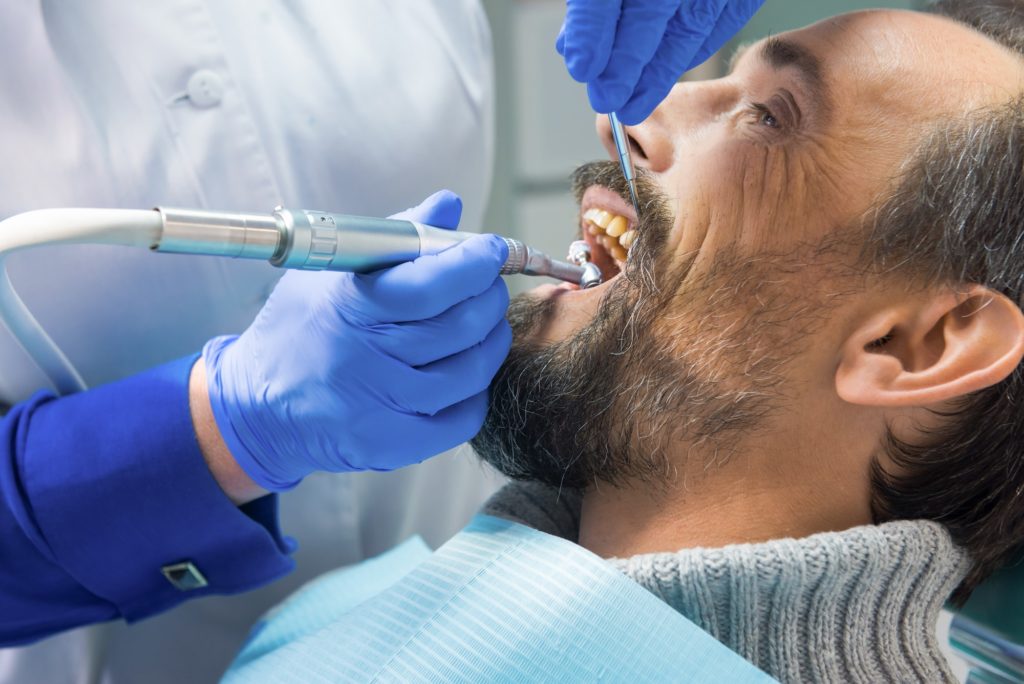Teeth Cleaning: Why it's so important!

We know what you’re thinking, “I clean my teeth twice every day; why would I pay someone else to clean my teeth?”. It sounds valid, but the simple name “teeth cleaning” doesn’t give it justice for the importance it has on the health of your teeth.
Table of Contents
What is a Teeth Cleaning & What Does it Involve?
A teeth cleaning is an appointment that you make with your dentist every six months to have your teeth thoroughly cleaned and checked out. During your appointment, you’ll receive preventative treatments and have the doctor diagnose any funny business going on. A few preventative treatments may include stain removal, fluoride treatments (to strengthen your teeth or stop early cavities), plaque and tartar removal, and teeth polishing. While the diagnostic checks include looking at gum tissue and X-rays of the mouth to look for tooth decay.
How Long Does a Teeth Cleaning Take?
Everyone’s teeth cleaning appointment is different and based upon the state of their mouth. The amount of time it will take depends on your oral health. The healthier your teeth are, the quicker your appointment will be (this is another great reason to practice good oral hygiene.). The appointment should only take about 30 minutes for people with healthy and clean teeth. However, teeth cleaning can take an hour for people with poor oral hygiene or complex issues like cavities and tartar buildup. This is because your dentist will have to scrape the plaque and tartar off your teeth. Since plaque is clear, spotting it in hard-to-see places is complicated. Simply put, the more you care for your teeth at home, the less time you’ll spend in the chair at the dentist.
What Does the Dentist Do at a Teeth Cleaning?
1. They Check the Health of Your Mouth
Your dentist will take an in-depth look at your gums, teeth, and mouth for signs of tooth decay and other oral health complications.
2. Remove Plaque from Your Teeth
Since plaque is very tricky to remove at home, it’s important to see your dentist and dental hygienist for teeth cleaning. Your dentist has special tools to spot and remove plaque. If you don’t remove plaque in a timely manner, it will turn into tartar. Tartar cannot be removed with a toothbrush; only a dental professional can remove it during teeth cleaning.
3. Prevent Tooth Decay
Teeth cleanings help prevent tooth decay. Removing plaque is key since bacteria can stick to the plaque on your teeth. The bacteria will release acid that wears down your enamel (the protective layer of your teeth.), once the enamel is worn down, holes can form in your teeth, and bacteria can get inside your teeth, causing pain and decay. This can lead to infection or even teeth having to be extracted.
4. Prevent Gum Disease
Regular teeth cleanings can help you prevent gum disease. Gum disease can be caused by dental plaque. Although practicing good dental hygiene will prevent plaque from forming, once formed, only your dentist has the tools necessary to remove plaque that has built up on your teeth.
Why is a Teeth Cleaning so Important?
A teeth cleaning is more than just making sure your teeth are pearly white; it’s to keep your dental hygiene in check. Your dentist can diagnose any problems and start a road to treatment on the spot. Some problems will require your dentist’s expertise. Luckily for those who practice good dental hygiene, you’ll be in and out in no time at your teeth cleaning appointment. So if spending time at the dentist isn’t your thing, make sure to brush twice daily, floss, and keep your mouth clean!
Teeth Cleaning FAQs
Having your teeth professionally cleaned by a dentist or dental hygienist every six months is generally recommended. Regular dental cleanings are crucial for maintaining good oral hygiene and preventing oral health problems. Even with thorough brushing and flossing at home, plaque and tartar can accumulate on your teeth over time. These deposits can lead to tooth decay, gum disease, and other dental issues if not removed regularly. Dental cleanings involve the removal of plaque, tartar, and stains from your teeth, as well as a thorough examination of your oral health.
Your dentist will also check for any signs of potential problems and provide necessary treatments or recommendations. By scheduling regular dental cleanings every six months, you can help keep your teeth and gums healthy and minimize the risk of more significant dental problems in the future. However, it’s important to note that individual needs may vary, so it’s best to consult your dentist to determine the ideal cleaning frequency based on your oral health condition.
Getting your teeth cleaned is generally not a painful procedure. While you may experience some discomfort or sensitivity during cleaning, it is usually minimal and temporary. The dental hygienist or dentist will use special instruments to remove plaque, tartar, and stains from your teeth, and these instruments may cause mild scraping or vibrating sensations. If you have sensitive teeth or gum disease, you might feel some sensitivity or tenderness during the cleaning, but the dental professional will ensure your comfort.
Additionally, they may apply a topical numbing gel or use local anesthesia if necessary. Overall, dental cleanings are typically well-tolerated, and any discomfort is outweighed by the benefits of maintaining good oral health. If you have concerns or specific sensitivities, it’s best to communicate them with your dental professional so they can address your needs and ensure a more comfortable experience.
Deep teeth cleaning, or scaling and root planing, is a dental procedure to treat gum disease or advanced plaque buildup. It is usually done in multiple appointments, targeting specific areas of the mouth. The process involves using specialized instruments to remove plaque, tartar, and bacteria from below the gum line and along the roots of the teeth. The dentist or dental hygienist will carefully scrape and clean the surfaces of the teeth and roots, aiming to smooth them to prevent further bacterial growth and facilitate gum tissue healing.
Local anesthesia or numbing agents may ensure your comfort during the procedure. Deep teeth cleaning is essential for managing gum disease and promoting gum health. It may be followed by regular periodontal maintenance visits to monitor and maintain oral health.
